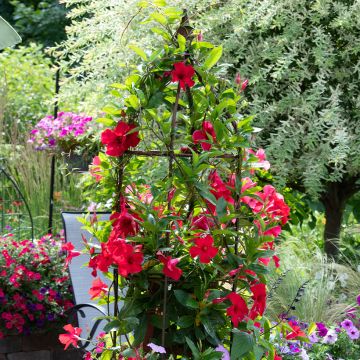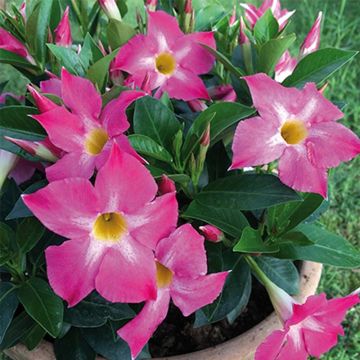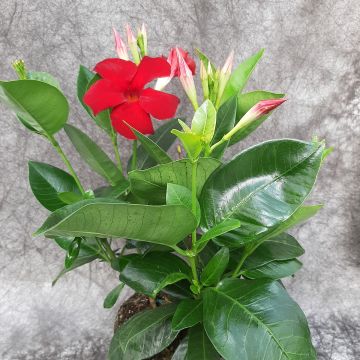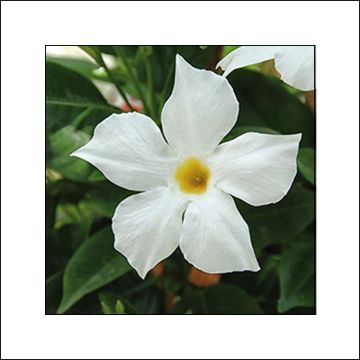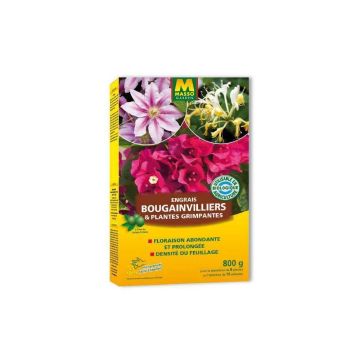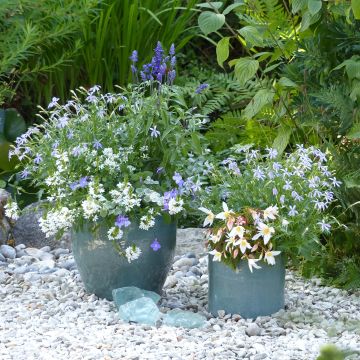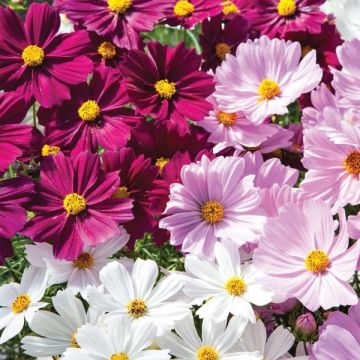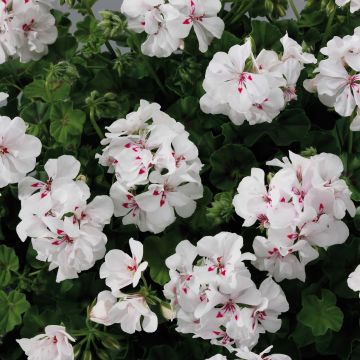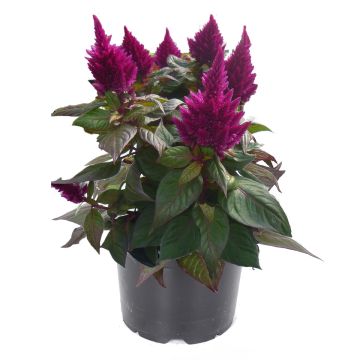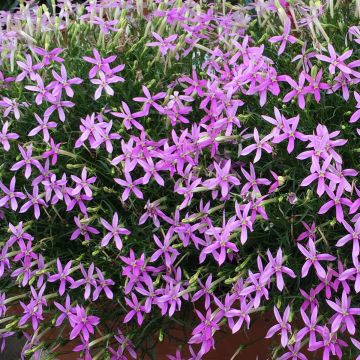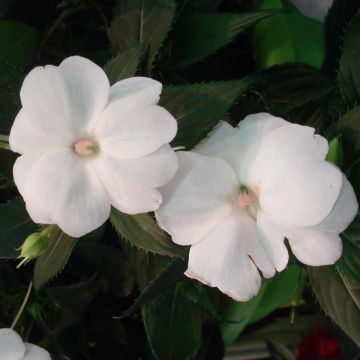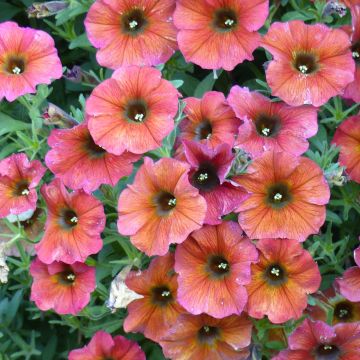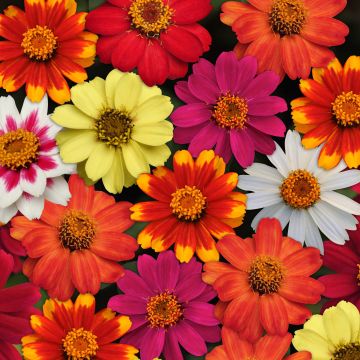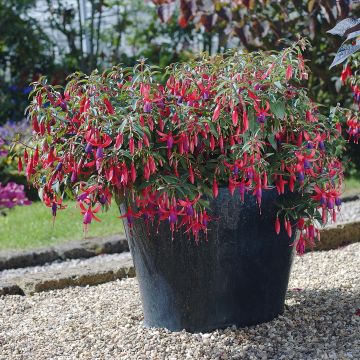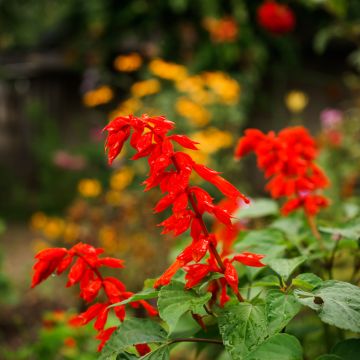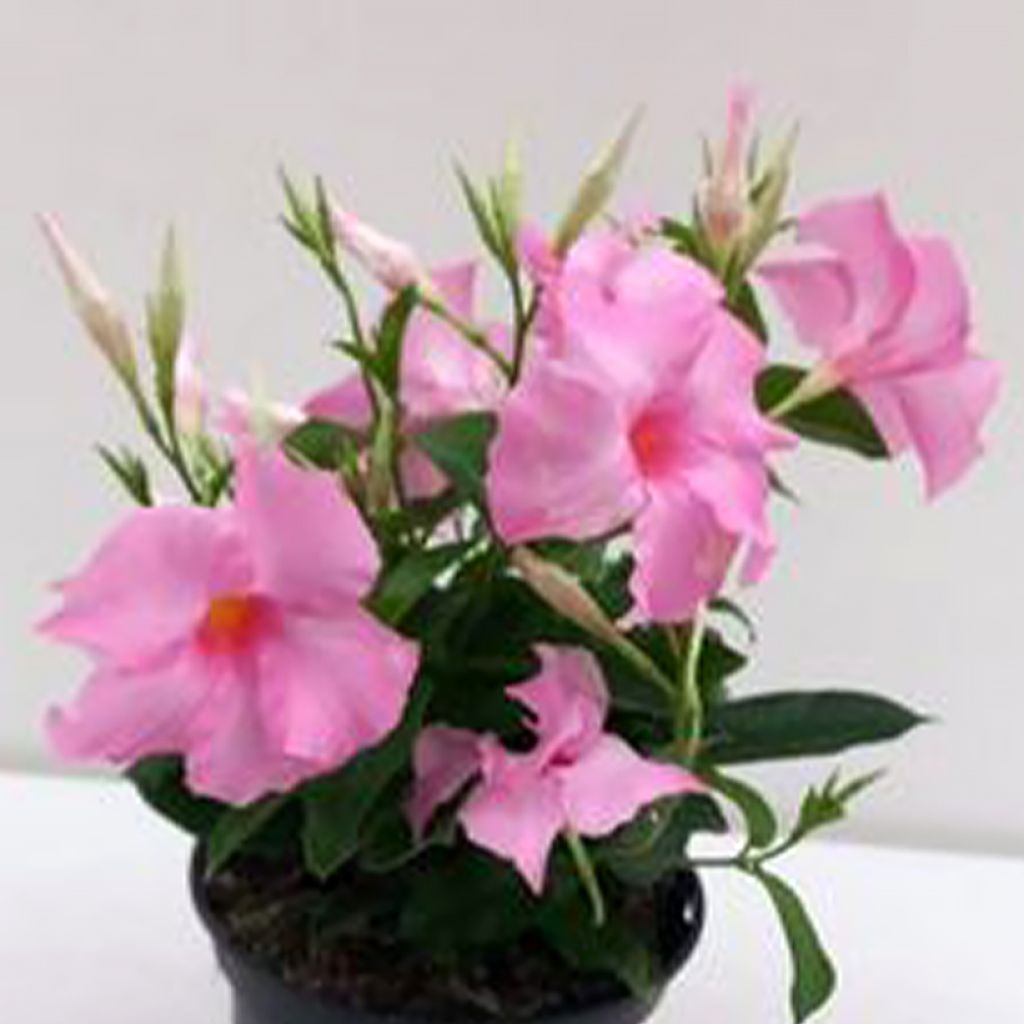

Mandevilla sanderi Diamantina Tourmaline Pink
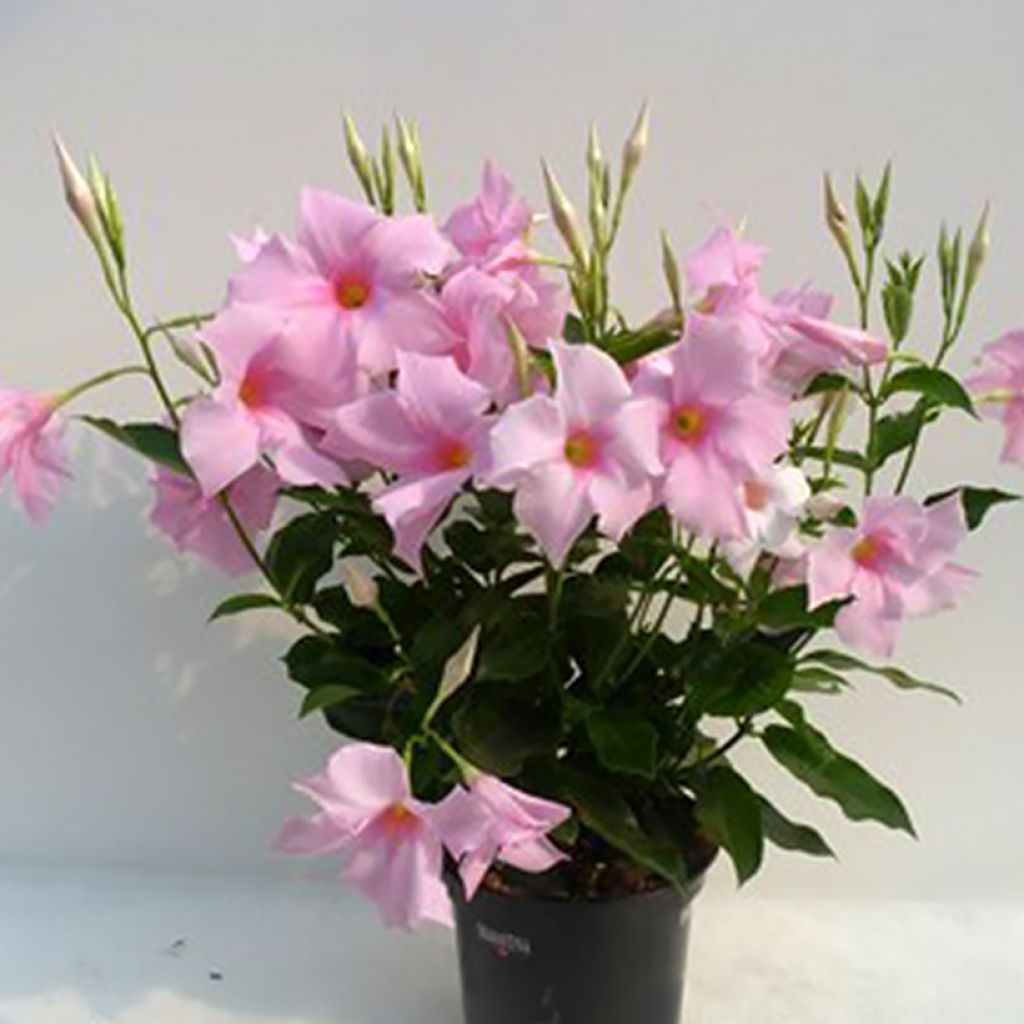

Mandevilla sanderi Diamantina Tourmaline Pink
Mandevilla sanderi Diamantina Tourmaline Pink
Dipladenia x hybrida Diamantina Tourmaline Pink
Brazilian Jasmine, Mandevilla, Rocktrumpet, Dipladenia
This plant carries a 6 months recovery warranty
More information
We guarantee the quality of our plants for a full growing cycle, and will replace at our expense any plant that fails to recover under normal climatic and planting conditions.
From €5.90 for pickup delivery and €6.90 for home delivery
Express home delivery from €8.90.
Does this plant fit my garden?
Set up your Plantfit profile →
Description
Dipladenia or Mandevilla sanderi Diamantina Tourmaline 'Pink' is a very compact bushy plant that does not exceed 50 cm high and does not require support. This new variety offers giant, 10 to 11 cm diameter flowers in pale pink with an orange centre. They bloom on dark foliage from May until the first frost. This plant flowers generously but is sensitive to cold, it will easily survive the winter behind a bay window, in a bright conservatory, or a lightly heated greenhouse.
Mandevillas were named in honour of diplomat and gardener Henry Mandeville. They are generally climbing, fast-growing plants, mostly native to the tropical forests of Serra de Orgaos, near Rio de Janeiro, Brazil. These tropical plants grow at high altitudes and thrive in temperate climates, spared from frost, in semi-shade or filtered light in summer. In the 1970s, Robert Lannes, a French horticulturist based in Tarn-et-Garonne, was the first to take an interest in hybridising these plants with immense potential. Years of research and selection have resulted in particularly floriferous, more compact varieties with various colours, easy to grow for amateur gardeners.
The Diamantina series, derived from Mandevilla sanderi among others, produces compact plants, well suited for pot cultivation and stands out with a wide range of colours, even offering some unprecedented shades like the white with a yellow-orange heart in 'Jade White'.
Tourmaline 'Pink' stands out with particularly large flowers, but has the bushy and compact habit that characterises plants in this series. Its short, woody, twining stems can manage without support. It will rapidly reach an average size of 30 to 50 cm in all directions. Its beautiful, large, 10 to 11 cm diameter flowers, consist of 5 large pale pink lobes that overlap like the blades of a propeller. They are grouped in small clusters and bloom continuously from May until the frost. The evergreen and leathery foliage consists of small dark green leaves arranged in an opposite pattern. The thick and leathery lamina is oval to elliptical with a shiny upper surface. This plant has fine roots and large tuberous roots, storage organs that contain starch and water, allowing the plant to withstand drought quite well.
Dipladenias or Mandevillas are prized for decorating terraces, balconies, and patios, as well as pergolas and trellises and lend themselves to a variety of settings, depending on their habit and compactness, whether planted alone or combined with other colours. The Diamantina Tourmaline 'Pink' variety stands out for its heat resistance and fits well in large flower pots, which its impressive flowers illuminate, as a centrepiece or in troughs, even in direct sun on a terrace or balcony. It harmonises perfectly with Ceratostigma plumbaginoides, or with Diamond Frost Euphorbia with white flowers or a foliage plant like Silver Falls Dichondra. It is only recommended for growing in the open ground in frost-protected areas like the south of the Atlantic coast or in regions where orange trees grow, along the Mediterranean coast.
Report an error about the product description
Mandevilla sanderi Diamantina Tourmaline Pink in pictures
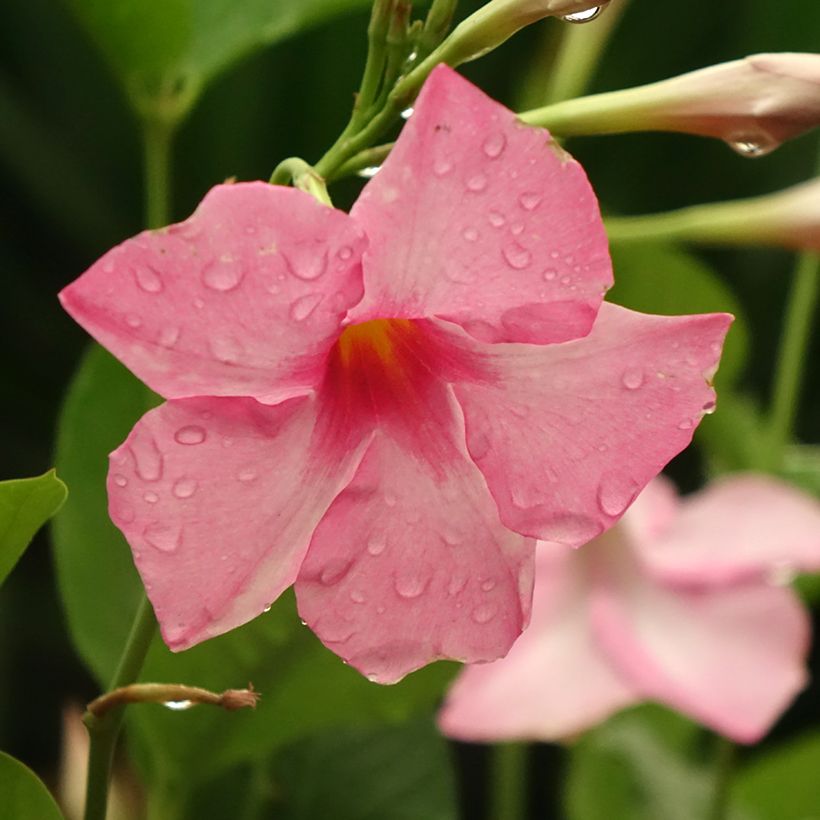

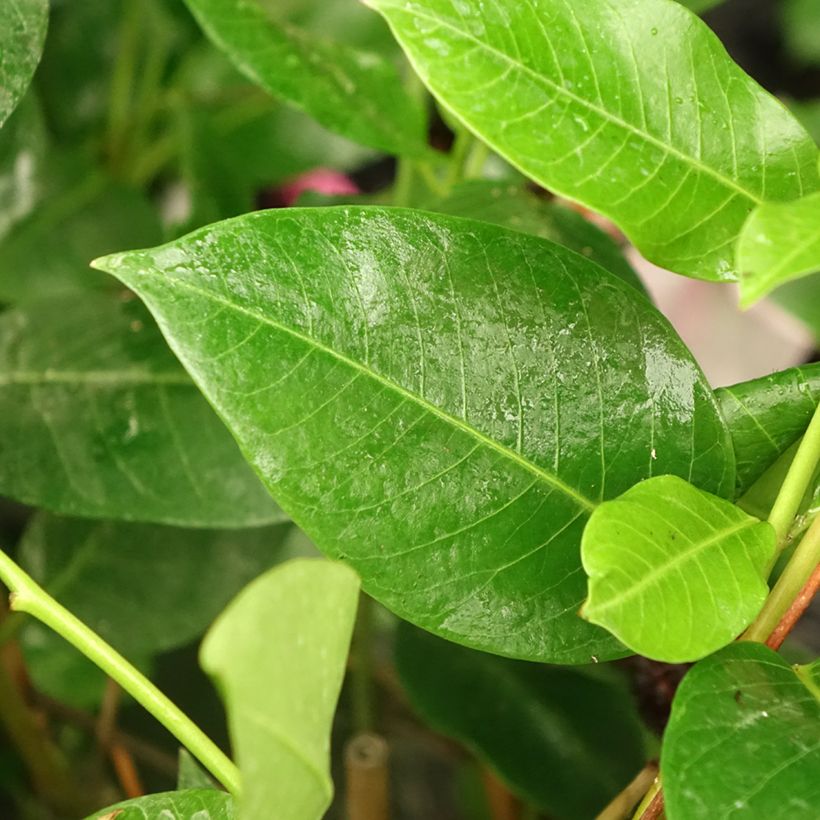

Flowering
Foliage
Plant habit
Botanical data
Dipladenia
x hybrida
Diamantina Tourmaline Pink
Apocynaceae
Brazilian Jasmine, Mandevilla, Rocktrumpet, Dipladenia
Cultivar or hybrid
Other Dipladenia or Mandevilla
Planting and care
Plant your Mandevilla sanderi Diamantina Tourmaline Pink in the ground after the last frost. The ideal location is a sunny spot with an East exposure that provides light shade during the hottest part of the day in summer. Plant them in a soil enriched with compost and coarse sand. You can also plant them in pots placed in a protected area, which you can bring out during the warmer days. Dipladenia plants require well-drained soil, preferably dry, but not necessarily very rich to avoid promoting foliage production at the expense of flowering. Water moderately. In pots, regular watering is necessary in summer, as well as the addition of flowering plant fertiliser. Allow the soil to dry between waterings. You can keep your Mandevilla by bringing them indoors under a veranda or to a cold greenhouse in winter. They do not tolerate temperatures below 5° well.
Growing them in the ground throughout the year is only possible in regions completely unaffected by frost.
Planting period
Intended location
Care
This item has not been reviewed yet - be the first to leave a review about it.
Plug plants - Annuals
Haven't found what you were looking for?
Hardiness is the lowest winter temperature a plant can endure without suffering serious damage or even dying. However, hardiness is affected by location (a sheltered area, such as a patio), protection (winter cover) and soil type (hardiness is improved by well-drained soil).

Photo Sharing Terms & Conditions
In order to encourage gardeners to interact and share their experiences, Promesse de fleurs offers various media enabling content to be uploaded onto its Site - in particular via the ‘Photo sharing’ module.
The User agrees to refrain from:
- Posting any content that is illegal, prejudicial, insulting, racist, inciteful to hatred, revisionist, contrary to public decency, that infringes on privacy or on the privacy rights of third parties, in particular the publicity rights of persons and goods, intellectual property rights, or the right to privacy.
- Submitting content on behalf of a third party;
- Impersonate the identity of a third party and/or publish any personal information about a third party;
In general, the User undertakes to refrain from any unethical behaviour.
All Content (in particular text, comments, files, images, photos, videos, creative works, etc.), which may be subject to property or intellectual property rights, image or other private rights, shall remain the property of the User, subject to the limited rights granted by the terms of the licence granted by Promesse de fleurs as stated below. Users are at liberty to publish or not to publish such Content on the Site, notably via the ‘Photo Sharing’ facility, and accept that this Content shall be made public and freely accessible, notably on the Internet.
Users further acknowledge, undertake to have ,and guarantee that they hold all necessary rights and permissions to publish such material on the Site, in particular with regard to the legislation in force pertaining to any privacy, property, intellectual property, image, or contractual rights, or rights of any other nature. By publishing such Content on the Site, Users acknowledge accepting full liability as publishers of the Content within the meaning of the law, and grant Promesse de fleurs, free of charge, an inclusive, worldwide licence for the said Content for the entire duration of its publication, including all reproduction, representation, up/downloading, displaying, performing, transmission, and storage rights.
Users also grant permission for their name to be linked to the Content and accept that this link may not always be made available.
By engaging in posting material, Users consent to their Content becoming automatically accessible on the Internet, in particular on other sites and/or blogs and/or web pages of the Promesse de fleurs site, including in particular social pages and the Promesse de fleurs catalogue.
Users may secure the removal of entrusted content free of charge by issuing a simple request via our contact form.
The flowering period indicated on our website applies to countries and regions located in USDA zone 8 (France, the United Kingdom, Ireland, the Netherlands, etc.)
It will vary according to where you live:
- In zones 9 to 10 (Italy, Spain, Greece, etc.), flowering will occur about 2 to 4 weeks earlier.
- In zones 6 to 7 (Germany, Poland, Slovenia, and lower mountainous regions), flowering will be delayed by 2 to 3 weeks.
- In zone 5 (Central Europe, Scandinavia), blooming will be delayed by 3 to 5 weeks.
In temperate climates, pruning of spring-flowering shrubs (forsythia, spireas, etc.) should be done just after flowering.
Pruning of summer-flowering shrubs (Indian Lilac, Perovskia, etc.) can be done in winter or spring.
In cold regions as well as with frost-sensitive plants, avoid pruning too early when severe frosts may still occur.
The planting period indicated on our website applies to countries and regions located in USDA zone 8 (France, United Kingdom, Ireland, Netherlands).
It will vary according to where you live:
- In Mediterranean zones (Marseille, Madrid, Milan, etc.), autumn and winter are the best planting periods.
- In continental zones (Strasbourg, Munich, Vienna, etc.), delay planting by 2 to 3 weeks in spring and bring it forward by 2 to 4 weeks in autumn.
- In mountainous regions (the Alps, Pyrenees, Carpathians, etc.), it is best to plant in late spring (May-June) or late summer (August-September).
The harvesting period indicated on our website applies to countries and regions in USDA zone 8 (France, England, Ireland, the Netherlands).
In colder areas (Scandinavia, Poland, Austria...) fruit and vegetable harvests are likely to be delayed by 3-4 weeks.
In warmer areas (Italy, Spain, Greece, etc.), harvesting will probably take place earlier, depending on weather conditions.
The sowing periods indicated on our website apply to countries and regions within USDA Zone 8 (France, UK, Ireland, Netherlands).
In colder areas (Scandinavia, Poland, Austria...), delay any outdoor sowing by 3-4 weeks, or sow under glass.
In warmer climes (Italy, Spain, Greece, etc.), bring outdoor sowing forward by a few weeks.

































